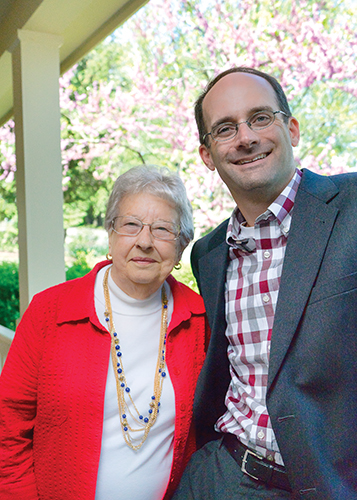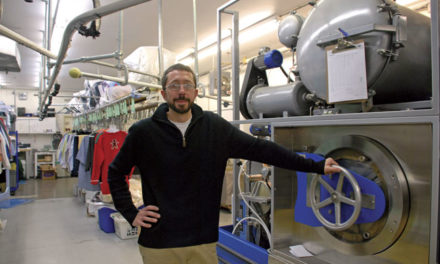
l-r) Bloomington Hospital Foundation founding board member Doris Brineman and Jon Barada, foundation president. Photo by Martin Boling
BY MOLLY BRUSH
If you live in south-central Indiana, you’ve almost certainly benefited from the work of the Bloomington Hospital Foundation at some point in your life. Established in 1967 by Bloomington’s Local Council of Women, the foundation has grown into a major force in health care philanthropy.
“It was started by the Local Council of Women and then it developed a life of its own,” says Doris Brineman, one of the founding board members.
In the foundation’s earliest years, special events were an important source of funding. One fundraiser was the Festival of Trees, in which community groups decorated Christmas trees that were sold to local residents and businesses. Another popular event was a formal ball held at College Mall. Though the amounts raised weren’t huge, little by little the group increased its resources.
“We used to be happy if we had $5,000,” Brineman says.
The efforts of the Local Council of Women created a legacy on which the foundation continues to build, says Jon Barada, foundation president. As the organization celebrates its 50th anniversary, it has assets of more than $30 million. In 2016, it returned $2.1 million to the community through its philanthropic efforts.
But according to Barada, the foundation is defined not by the amount of money it raises, but rather by how it improves the lives of people in Bloomington and surrounding communities.
“It’s always been about the people here,” he says. “How do we take care of our neighbors and our loved ones?”
Though Bloomington Hospital is now part of IU Health, the Bloomington Hospital Foundation exists to support the local hospital. The foundation is governed by a local board of directors, and its priority is to use its resources close to home.
“We believe that the work we do every day is to really enhance what’s happening right here in this community,” Barada says.
That work includes projects that address a wide range of health care needs. In recent years, the foundation led a campaign that raised $720,000 for upgrades to the hospital’s neonatal intensive care unit, allowing the hospital to care for babies born as early as 26 weeks.
Another campaign raised $320,000 to provide equipment that enabled the hospital to become a verified Level III trauma center. And a nearly $3 million campaign supported the construction of Hospice House, an inpatient hospice facility. The foundation also provides ongoing support to the Children’s Therapy Center, the Olcott Center for Cancer Education, and numerous other Bloomington Hospital programs and services.
Just as it did in its early years, the foundation today raises much of its funding from special events, including Hoosiers Outrun Cancer, the state’s largest 5K race; 100 Men Who Cook, in which local men compete to win the title of Top Chef; and its annual gala, which will be held December 2 this year.
According to Barada, the foundation is still determining what its role will be when IU Health Bloomington Hospital moves to its new home as part of a regional academic health campus to be constructed on the IU Golf Course driving range. But he’s certain of one thing: “Our future, whatever it is, will be rooted in, ‘How do we improve the lives of the people that we are honored to serve at the hospital?’”





